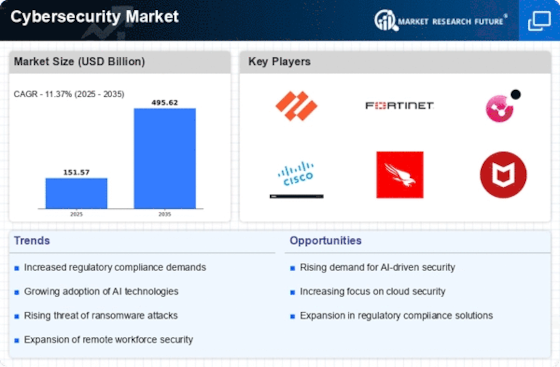Network Security
Endpoint Security
Application Security
Cloud Security
Data Security
Consulting Services
Training and Education
Managed Security Services
Implementation Services
Support Services
On-premises
Cloud-based
Hybrid
BFSI
Healthcare
Government
Retail
Telecommunications
North America
Europe
South America
Asia Pacific
Middle East and Africa
North America Outlook (USD Billion, 2019-2035)
North America Cybersecurity Market by Security Type
Network Security
Endpoint Security
Application Security
Cloud Security
Data Security
North America Cybersecurity Market by Service Type
Consulting Services
Training and Education
Managed Security Services
Implementation Services
Support Services
North America Cybersecurity Market by Deployment Type
On-premises
Cloud-based
Hybrid
North America Cybersecurity Market by End Use Type
BFSI
Healthcare
Government
Retail
Telecommunications
North America Cybersecurity Market by Regional Type
US
Canada
US Outlook (USD Billion, 2019-2035)
US Cybersecurity Market by Security Type
Network Security
Endpoint Security
Application Security
Cloud Security
Data Security
US Cybersecurity Market by Service Type
Consulting Services
Training and Education
Managed Security Services
Implementation Services
Support Services
US Cybersecurity Market by Deployment Type
On-premises
Cloud-based
Hybrid
US Cybersecurity Market by End Use Type
BFSI
Healthcare
Government
Retail
Telecommunications
CANADA Outlook (USD Billion, 2019-2035)
CANADA Cybersecurity Market by Security Type
Network Security
Endpoint Security
Application Security
Cloud Security
Data Security
CANADA Cybersecurity Market by Service Type
Consulting Services
Training and Education
Managed Security Services
Implementation Services
Support Services
CANADA Cybersecurity Market by Deployment Type
On-premises
Cloud-based
Hybrid
CANADA Cybersecurity Market by End Use Type
BFSI
Healthcare
Government
Retail
Telecommunications
Europe Outlook (USD Billion, 2019-2035)
Europe Cybersecurity Market by Security Type
Network Security
Endpoint Security
Application Security
Cloud Security
Data Security
Europe Cybersecurity Market by Service Type
Consulting Services
Training and Education
Managed Security Services
Implementation Services
Support Services
Europe Cybersecurity Market by Deployment Type
On-premises
Cloud-based
Hybrid
Europe Cybersecurity Market by End Use Type
BFSI
Healthcare
Government
Retail
Telecommunications
Europe Cybersecurity Market by Regional Type
Germany
UK
France
Russia
Italy
Spain
Rest of Europe
GERMANY Outlook (USD Billion, 2019-2035)
GERMANY Cybersecurity Market by Security Type
Network Security
Endpoint Security
Application Security
Cloud Security
Data Security
GERMANY Cybersecurity Market by Service Type
Consulting Services
Training and Education
Managed Security Services
Implementation Services
Support Services
GERMANY Cybersecurity Market by Deployment Type
On-premises
Cloud-based
Hybrid
GERMANY Cybersecurity Market by End Use Type
BFSI
Healthcare
Government
Retail
Telecommunications
UK Outlook (USD Billion, 2019-2035)
UK Cybersecurity Market by Security Type
Network Security
Endpoint Security
Application Security
Cloud Security
Data Security
UK Cybersecurity Market by Service Type
Consulting Services
Training and Education
Managed Security Services
Implementation Services
Support Services
UK Cybersecurity Market by Deployment Type
On-premises
Cloud-based
Hybrid
UK Cybersecurity Market by End Use Type
BFSI
Healthcare
Government
Retail
Telecommunications
FRANCE Outlook (USD Billion, 2019-2035)
FRANCE Cybersecurity Market by Security Type
Network Security
Endpoint Security
Application Security
Cloud Security
Data Security
FRANCE Cybersecurity Market by Service Type
Consulting Services
Training and Education
Managed Security Services
Implementation Services
Support Services
FRANCE Cybersecurity Market by Deployment Type
On-premises
Cloud-based
Hybrid
FRANCE Cybersecurity Market by End Use Type
BFSI
Healthcare
Government
Retail
Telecommunications
RUSSIA Outlook (USD Billion, 2019-2035)
RUSSIA Cybersecurity Market by Security Type
Network Security
Endpoint Security
Application Security
Cloud Security
Data Security
RUSSIA Cybersecurity Market by Service Type
Consulting Services
Training and Education
Managed Security Services
Implementation Services
Support Services
RUSSIA Cybersecurity Market by Deployment Type
On-premises
Cloud-based
Hybrid
RUSSIA Cybersecurity Market by End Use Type
BFSI
Healthcare
Government
Retail
Telecommunications
ITALY Outlook (USD Billion, 2019-2035)
ITALY Cybersecurity Market by Security Type
Network Security
Endpoint Security
Application Security
Cloud Security
Data Security
ITALY Cybersecurity Market by Service Type
Consulting Services
Training and Education
Managed Security Services
Implementation Services
Support Services
ITALY Cybersecurity Market by Deployment Type
On-premises
Cloud-based
Hybrid
ITALY Cybersecurity Market by End Use Type
BFSI
Healthcare
Government
Retail
Telecommunications
SPAIN Outlook (USD Billion, 2019-2035)
SPAIN Cybersecurity Market by Security Type
Network Security
Endpoint Security
Application Security
Cloud Security
Data Security
SPAIN Cybersecurity Market by Service Type
Consulting Services
Training and Education
Managed Security Services
Implementation Services
Support Services
SPAIN Cybersecurity Market by Deployment Type
On-premises
Cloud-based
Hybrid
SPAIN Cybersecurity Market by End Use Type
BFSI
Healthcare
Government
Retail
Telecommunications
REST OF EUROPE Outlook (USD Billion, 2019-2035)
REST OF EUROPE Cybersecurity Market by Security Type
Network Security
Endpoint Security
Application Security
Cloud Security
Data Security
REST OF EUROPE Cybersecurity Market by Service Type
Consulting Services
Training and Education
Managed Security Services
Implementation Services
Support Services
REST OF EUROPE Cybersecurity Market by Deployment Type
On-premises
Cloud-based
Hybrid
REST OF EUROPE Cybersecurity Market by End Use Type
BFSI
Healthcare
Government
Retail
Telecommunications
APAC Outlook (USD Billion, 2019-2035)
APAC Cybersecurity Market by Security Type
Network Security
Endpoint Security
Application Security
Cloud Security
Data Security
APAC Cybersecurity Market by Service Type
Consulting Services
Training and Education
Managed Security Services
Implementation Services
Support Services
APAC Cybersecurity Market by Deployment Type
On-premises
Cloud-based
Hybrid
APAC Cybersecurity Market by End Use Type
BFSI
Healthcare
Government
Retail
Telecommunications
APAC Cybersecurity Market by Regional Type
China
India
Japan
South Korea
Malaysia
Thailand
Indonesia
Rest of APAC
CHINA Outlook (USD Billion, 2019-2035)
CHINA Cybersecurity Market by Security Type
Network Security
Endpoint Security
Application Security
Cloud Security
Data Security
CHINA Cybersecurity Market by Service Type
Consulting Services
Training and Education
Managed Security Services
Implementation Services
Support Services
CHINA Cybersecurity Market by Deployment Type
On-premises
Cloud-based
Hybrid
CHINA Cybersecurity Market by End Use Type
BFSI
Healthcare
Government
Retail
Telecommunications
INDIA Outlook (USD Billion, 2019-2035)
INDIA Cybersecurity Market by Security Type
Network Security
Endpoint Security
Application Security
Cloud Security
Data Security
INDIA Cybersecurity Market by Service Type
Consulting Services
Training and Education
Managed Security Services
Implementation Services
Support Services
INDIA Cybersecurity Market by Deployment Type
On-premises
Cloud-based
Hybrid
INDIA Cybersecurity Market by End Use Type
BFSI
Healthcare
Government
Retail
Telecommunications
JAPAN Outlook (USD Billion, 2019-2035)
JAPAN Cybersecurity Market by Security Type
Network Security
Endpoint Security
Application Security
Cloud Security
Data Security
JAPAN Cybersecurity Market by Service Type
Consulting Services
Training and Education
Managed Security Services
Implementation Services
Support Services
JAPAN Cybersecurity Market by Deployment Type
On-premises
Cloud-based
Hybrid
JAPAN Cybersecurity Market by End Use Type
BFSI
Healthcare
Government
Retail
Telecommunications
SOUTH KOREA Outlook (USD Billion, 2019-2035)
SOUTH KOREA Cybersecurity Market by Security Type
Network Security
Endpoint Security
Application Security
Cloud Security
Data Security
SOUTH KOREA Cybersecurity Market by Service Type
Consulting Services
Training and Education
Managed Security Services
Implementation Services
Support Services
SOUTH KOREA Cybersecurity Market by Deployment Type
On-premises
Cloud-based
Hybrid
SOUTH KOREA Cybersecurity Market by End Use Type
BFSI
Healthcare
Government
Retail
Telecommunications
MALAYSIA Outlook (USD Billion, 2019-2035)
MALAYSIA Cybersecurity Market by Security Type
Network Security
Endpoint Security
Application Security
Cloud Security
Data Security
MALAYSIA Cybersecurity Market by Service Type
Consulting Services
Training and Education
Managed Security Services
Implementation Services
Support Services
MALAYSIA Cybersecurity Market by Deployment Type
On-premises
Cloud-based
Hybrid
MALAYSIA Cybersecurity Market by End Use Type
BFSI
Healthcare
Government
Retail
Telecommunications
THAILAND Outlook (USD Billion, 2019-2035)
THAILAND Cybersecurity Market by Security Type
Network Security
Endpoint Security
Application Security
Cloud Security
Data Security
THAILAND Cybersecurity Market by Service Type
Consulting Services
Training and Education
Managed Security Services
Implementation Services
Support Services
THAILAND Cybersecurity Market by Deployment Type
On-premises
Cloud-based
Hybrid
THAILAND Cybersecurity Market by End Use Type
BFSI
Healthcare
Government
Retail
Telecommunications
INDONESIA Outlook (USD Billion, 2019-2035)
INDONESIA Cybersecurity Market by Security Type
Network Security
Endpoint Security
Application Security
Cloud Security
Data Security
INDONESIA Cybersecurity Market by Service Type
Consulting Services
Training and Education
Managed Security Services
Implementation Services
Support Services
INDONESIA Cybersecurity Market by Deployment Type
On-premises
Cloud-based
Hybrid
INDONESIA Cybersecurity Market by End Use Type
BFSI
Healthcare
Government
Retail
Telecommunications
REST OF APAC Outlook (USD Billion, 2019-2035)
REST OF APAC Cybersecurity Market by Security Type
Network Security
Endpoint Security
Application Security
Cloud Security
Data Security
REST OF APAC Cybersecurity Market by Service Type
Consulting Services
Training and Education
Managed Security Services
Implementation Services
Support Services
REST OF APAC Cybersecurity Market by Deployment Type
On-premises
Cloud-based
Hybrid
REST OF APAC Cybersecurity Market by End Use Type
BFSI
Healthcare
Government
Retail
Telecommunications
South America Outlook (USD Billion, 2019-2035)
South America Cybersecurity Market by Security Type
Network Security
Endpoint Security
Application Security
Cloud Security
Data Security
South America Cybersecurity Market by Service Type
Consulting Services
Training and Education
Managed Security Services
Implementation Services
Support Services
South America Cybersecurity Market by Deployment Type
On-premises
Cloud-based
Hybrid
South America Cybersecurity Market by End Use Type
BFSI
Healthcare
Government
Retail
Telecommunications
South America Cybersecurity Market by Regional Type
Brazil
Mexico
Argentina
Rest of South America
BRAZIL Outlook (USD Billion, 2019-2035)
BRAZIL Cybersecurity Market by Security Type
Network Security
Endpoint Security
Application Security
Cloud Security
Data Security
BRAZIL Cybersecurity Market by Service Type
Consulting Services
Training and Education
Managed Security Services
Implementation Services
Support Services
BRAZIL Cybersecurity Market by Deployment Type
On-premises
Cloud-based
Hybrid
BRAZIL Cybersecurity Market by End Use Type
BFSI
Healthcare
Government
Retail
Telecommunications
MEXICO Outlook (USD Billion, 2019-2035)
MEXICO Cybersecurity Market by Security Type
Network Security
Endpoint Security
Application Security
Cloud Security
Data Security
MEXICO Cybersecurity Market by Service Type
Consulting Services
Training and Education
Managed Security Services
Implementation Services
Support Services
MEXICO Cybersecurity Market by Deployment Type
On-premises
Cloud-based
Hybrid
MEXICO Cybersecurity Market by End Use Type
BFSI
Healthcare
Government
Retail
Telecommunications
ARGENTINA Outlook (USD Billion, 2019-2035)
ARGENTINA Cybersecurity Market by Security Type
Network Security
Endpoint Security
Application Security
Cloud Security
Data Security
ARGENTINA Cybersecurity Market by Service Type
Consulting Services
Training and Education
Managed Security Services
Implementation Services
Support Services
ARGENTINA Cybersecurity Market by Deployment Type
On-premises
Cloud-based
Hybrid
ARGENTINA Cybersecurity Market by End Use Type
BFSI
Healthcare
Government
Retail
Telecommunications
REST OF SOUTH AMERICA Outlook (USD Billion, 2019-2035)
REST OF SOUTH AMERICA Cybersecurity Market by Security Type
Network Security
Endpoint Security
Application Security
Cloud Security
Data Security
REST OF SOUTH AMERICA Cybersecurity Market by Service Type
Consulting Services
Training and Education
Managed Security Services
Implementation Services
Support Services
REST OF SOUTH AMERICA Cybersecurity Market by Deployment Type
On-premises
Cloud-based
Hybrid
REST OF SOUTH AMERICA Cybersecurity Market by End Use Type
BFSI
Healthcare
Government
Retail
Telecommunications
MEA Outlook (USD Billion, 2019-2035)
MEA Cybersecurity Market by Security Type
Network Security
Endpoint Security
Application Security
Cloud Security
Data Security
MEA Cybersecurity Market by Service Type
Consulting Services
Training and Education
Managed Security Services
Implementation Services
Support Services
MEA Cybersecurity Market by Deployment Type
On-premises
Cloud-based
Hybrid
MEA Cybersecurity Market by End Use Type
BFSI
Healthcare
Government
Retail
Telecommunications
MEA Cybersecurity Market by Regional Type
GCC Countries
South Africa
Rest of MEA
GCC COUNTRIES Outlook (USD Billion, 2019-2035)
GCC COUNTRIES Cybersecurity Market by Security Type
Network Security
Endpoint Security
Application Security
Cloud Security
Data Security
GCC COUNTRIES Cybersecurity Market by Service Type
Consulting Services
Training and Education
Managed Security Services
Implementation Services
Support Services
GCC COUNTRIES Cybersecurity Market by Deployment Type
On-premises
Cloud-based
Hybrid
GCC COUNTRIES Cybersecurity Market by End Use Type
BFSI
Healthcare
Government
Retail
Telecommunications
SOUTH AFRICA Outlook (USD Billion, 2019-2035)
SOUTH AFRICA Cybersecurity Market by Security Type
Network Security
Endpoint Security
Application Security
Cloud Security
Data Security
SOUTH AFRICA Cybersecurity Market by Service Type
Consulting Services
Training and Education
Managed Security Services
Implementation Services
Support Services
SOUTH AFRICA Cybersecurity Market by Deployment Type
On-premises
Cloud-based
Hybrid
SOUTH AFRICA Cybersecurity Market by End Use Type
BFSI
Healthcare
Government
Retail
Telecommunications
REST OF MEA Outlook (USD Billion, 2019-2035)
REST OF MEA Cybersecurity Market by Security Type
Network Security
Endpoint Security
Application Security
Cloud Security
Data Security
REST OF MEA Cybersecurity Market by Service Type
Consulting Services
Training and Education
Managed Security Services
Implementation Services
Support Services
REST OF MEA Cybersecurity Market by Deployment Type
On-premises
Cloud-based
Hybrid
REST OF MEA Cybersecurity Market by End Use Type
BFSI
Healthcare
Government
Retail
Telecommunications


















Leave a Comment